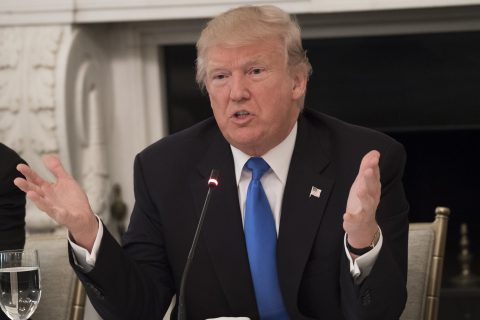by Yanan Wang
Agence France Presse
BEIJING, China (AFP) — Finger-pointing over North Korea’s flourishing weapons program has pushed the world’s two biggest economies toward a high-stakes impasse, but observers warn that Trump-style outbursts are no way to get China to bend to the United States’ will.
Washington and Beijing have long traded blame over the failure to rein in the North, but a breakthrough in missile technology has raised the specter of a strike by Pyongyang on American cities, escalating the rhetoric.
“I am very disappointed in China,” President Donald Trump tweeted after the North boasted last week that the entire mainland US was within range of its intercontinental ballistic missiles.
“Our foolish past leaders have allowed them to make hundreds of billions of dollars a year in trade, yet they do NOTHING for us with North Korea, just talk.”
China, North Korea’s main trade partner and ally, has repeatedly countered that it does not hold the key to the crisis and rejected Trump’s attempts to link the issue to the trade relationship.
While China’s restrained official responses have played the foil to Trump’s 140-character outbursts, state media has been less muted.
“Trump is quite a personality,” said an opinion piece published by Xinhua state news agency Monday.
“But emotional venting cannot become a guiding policy for solving the nuclear issue… and even less should (the US) stab China in the back.”
US Secretary of State Rex Tillerson stepped in on Tuesday to warn that the relationship with China had reached “a pivot point”.
“Can we work through those differences in a way without it leading to open conflict and find the solutions that are necessary to serve us both?” he asked in a briefing to reporters.

Cards versus tweets
Trump has repeatedly urged China to use its economic sway over North Korea to curb the regime’s nuclear program, while Beijing insists dialogue is the only practical way forward.
Tillerson has derided China and Russia as “economic enablers” that bear “unique and special responsibility” for the growing threat posed by the North.
And US Ambassador to the United Nations Nikki Haley spurned a UN response to the latest ICBM launch in favor of bomber flights and missile defense system tests, saying the time for talk on North Korea was “over.”
Such admonitions will not change the way China operates, analysts say.
“Trump might be brash and have an ‘in your face’ blunt style, but Beijing’s approach to Washington stays relatively the same,” Xu Guoqi, a Sino-US relations expert at the University of Hong Kong, told AFP.
“While Trump tweets his positions to the world, Beijing keeps its cards closer to its chest. (China) will never dance to Trump’s tune.”
And with “today’s America weaker and more isolated in the world,” China has even less reason to respond, he said.
China has reacted with caution to Trump’s unpredictable remarks, which have ranged from describing the country as a “currency manipulator” to calling President Xi Jinping “a very good man.”
Relations had warmed following Trump’s pledge to honor the key “One China” policy and Xi’s visit to Trump’s Mar-a-Lago estate in Florida this April, but they have since soured again over North Korea.
If the US does not ease off against an implacable China, observers believe a deterioration is inevitable.
“If the Americans continue to blame China while shifting away from its own obligation to defuse the crisis, the two powers are likely to have more quarrels,” said Zhong Zhenming, a Sino-US relations expert at Shanghai’s Tongji University.
“(This is) exactly the result Pyongyang hopes to see,” he told AFP.
No winners in a trade war
In June, the US slapped unprecedented sanctions on a Chinese bank accused of laundering North Korean cash after Trump tweeted that China’s efforts to curtail North Korea’s nuclear program had “not worked out.”
Yet analysts said Trump will stop short of following through on repeated threats to start a trade war — his main bargaining chip thus far.
“Neither China nor America could afford a trade war,” Zhong said.
An editorial in the state-run Global Times, a nationalistic tabloid, warned that the US would lose in a trade dispute with China, which as the top holder of US treasury bonds “is actually supporting the dollar.”
“Washington had better not threaten China with trade since China has the tools to safeguard its economic interests,” it said.
© Agence France-Presse







